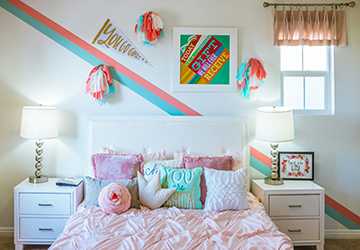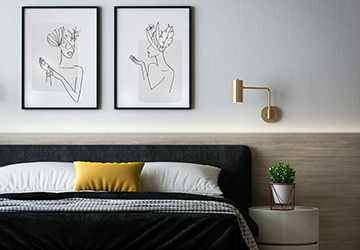
Crafting the Perfect Bedroom for Deep, Restful Sleep
Designing the ideal bedroom for peaceful sleep can be of great importance to a person's health. Comfort is not solely a goal; it also involves creating a space that alleviates tension and promotes harmony. Here are ten practical suggestions to help you make your bedroom the most beneficial for a good night's sleep.
Whether attempting to soothe your calming colours, purchase high-quality bedding, or create a technologically-free zone and develop a relaxing bedtime regimen, these tips have been intended to take your sleeping environment to a new level and facilitate better sleep. Let's take a trip and explore the small details that can lead to a good night's sleep.

Select calming colors
The colour of your bedroom will significantly affect your relaxation and peace. Attempt a low-key colour scheme that is pastel and serene, like pale blue, green, or neutral colours. These colour tones have a soothing effect, ideal for creating a peaceful environment promoting slumber. Attempt to avoid the brightest and boldest colours or patterns that are visually intriguing; these can be avoided, and instead, focus on the relaxing process.
Buy in the quality bedding section
Your sleeping bag is crucial to your successful night's sleep. You are funding the purchase of exceptional sheets, blankets, and pillowcases from natural, breathable fabrics like cotton and linen. These fabrics are lightweight, have air permeation, and are well-ventilated, keeping your body cool and dry at night. Select bed sheets with a count of threads from 200 to 400; this will provide the most incredible comfort and longevity.
Create a clean environment with no clutter
One disorganized room can increase stress and anxiety, which may impede one's ability to relax and sleep. Keep your room spotless and organized by tidying up regularly and finding a place to store the things that fill it. Consider getting some furniture with internal storage or using decorative containers and bins to conceal stuff while keeping it accessible.
Reduce the light and noise levels
Light and noise often disrupt your sleep schedule. As a result, it's crucial to control these aspects in your bedroom—purchase blackout curtains or shades to block the light of the street or the early morning sun. Use noisemakers or earplugs to cover up the sound of traffic or other undesirable sources. The dark, quiet atmosphere may be the most critical factor in helping you sleep faster and have a better night's sleep.
Improve comfort and help
Choose bed furniture and accessories that provide the most incredible comfort and support. Both the mattress and the pillow should have enough support to avoid pain and aches that can affect sleep. Attempt different pillow types, sizes, and firmness levels to determine the best pillow. Additionally, consider adding cosy features like a plush carpet, soft throw pillows, or inviting seating to relax in the bedroom.
Begin with aromatherapy
Incorporate aromatherapy into your bedroom for a peaceful and invigorating setting. Spread essential oils across the floor, such as lavender, chamomile, or eucalyptus, in the diffuser to soothe the mind and reduce stress. These smells have been around for a while and are soothing. They can also help you relax before you can sleep. For this, ensure you utilize the most effective essential oils and follow safety regulations when inhaling them in your bedroom.
Create a zone without technology
Create a zone without technology in your bedroom that will help you focus and get good sleep. Avoid electronic devices in the bedroom, such as smartphones, tablets, and TVs, especially before bed. The blue light on computers and televisions isn't beneficial to the body's internal timer and can lead to difficult sleep. Loosen up by reading a book, practising mild yoga, or listening to calming music before bed.

Lower the temperature of the room
Maintain a room temperature that promotes sleep relaxation. It's recommended that the room temperature be maintained between 60 and 67 degrees Fahrenheit (15 and 19 degrees Celsius). Establish a temperature controller for your room or utilize unique bed linings that can be altered to maintain your temperature and comfort while you sleep. Please don't allow it to be too hot or cold; this can affect your sleep pattern.
Spur the natural light exposure
Being around natural light during the day regulates your sleep-wake cycle. Unshackle the covers or blinds in the morning to let sunlight into your room. Natural light adjusts your biological timer and guarantees you will be aware of your surroundings during the day. As a result, it's essential to have a good sleep during the night. You may spend time near or outside the building during the day to enjoy the most natural light.
Create your bedtime soothing ritual
Having a regular bedtime regimen is crucial because it will allow your body to relax and be ready for sleep. Attempts at relaxation, such as taking a hot bath, practicing deep breathing, meditation, or keeping a gratitude log, are recommended. Avoid overindulgence or eating large meals near bedtime; these actions will impede your sleep quality. It's essential to be consistent with the routine in order to become habitual to it and to have good sleep patterns.
Conclusion
You can create a perfect place to sleep through these suggestions and a bedroom that promotes relaxation and comfort. Recognize the value of personalizing your space to conform to your preferences and liking. It's possible to choose colours that soothe the walls, upgrade the bed to a more luxurious style, or remove non-essential things to create a calming and serene environment. Don't be concerned if a small amount of effort and attention is what your bedroom needs to become a peaceful and quiet space.





